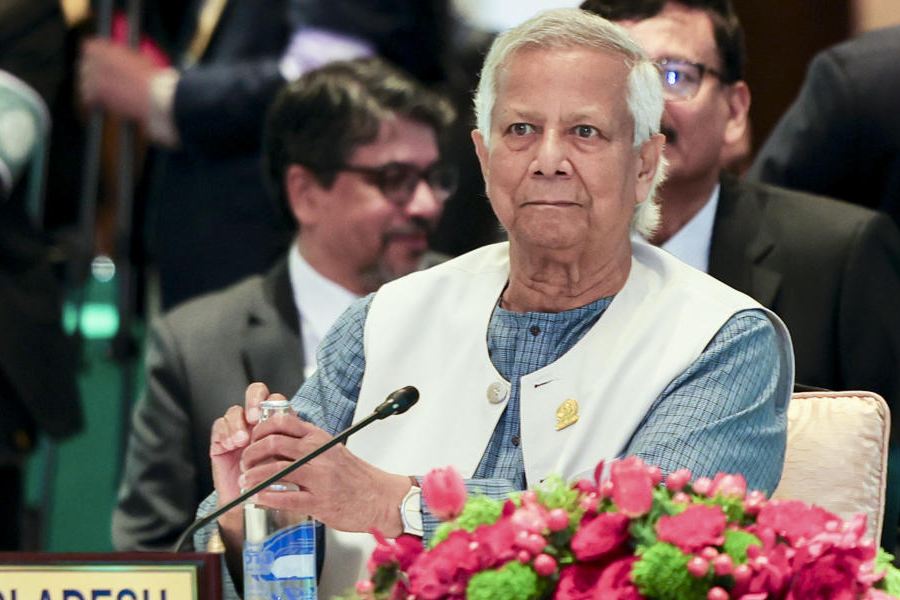New Delhi, Nov. 23 :
New Delhi, Nov. 23:
Twelve states have unanimously agreed to introduce value-added tax (VAT) with two basic rates of 4 and 12 per cent from April 1. A flat 20 per cent value-added tax will be charged on liquor.
An empowered committee of state finance ministers headed by Asim Dasgupta has agreed on two basic VAT rates. It will be a uniform 4 per cent across all states for goods considered to be basic necessities, industrial and agricultural inputs, declared goods, and capital goods (mainly machinery). The 4 per cent VAT will also cover additional excise duty (AED) items like textiles and sugar.
The second rate will be 10 per cent
general rate on all other commodities. There will be also two special rates for select items - 1 per cent for gold, silver, precious and semi-precious items, and 20 per cent on liquor.
However, unprocessed agricultural and industrial goods in the unorganised sector and goods of social importance would be exempted from VAT.
The introduction of VAT is expected to bring down the retail prices of several commodities, including liquor, since the single levy will replace a set of cascading levies under the existing sales tax system.
'There was complete unanimity among states. Most of them will be in a position to implement it from April. I have given them an assurance that if any state suffers any loss in revenue while implementing it, the Centre will compensate them for it,' finance minister Yashwant Sinha said after the meeting with the empowered committee on VAT.
Only 12, including the three newly-formed states, are in a position to implement it from April. These include West Bengal, Maharashtra, Gujarat, Punjab, Madhya Pradesh, Karnataka, Uttar Pradesh, Delhi, Haryana and Meghalaya. The remaining states will implement it from 2003.
The existing sales tax structure unduly increases the tax burden of a commodity
by taxing both imports and output and
thus creating a cascading burden of taxation, which creates distortions in the economy. VAT eliminates the tax burden by
setting off the tax paid on inputs and
supplies.
The VAT liability will be self-assessed by the dealer in terms of submission on returns upon setting off the tax on inputs/supplies. Return forms as well as other procedures will be simple, transparent and similar in all states. All dealers are expected to be audited at least once in five years. If evasion is detected on audit, the dealer will then be assessed for all the previous years.
Industrial units enjoying remission or deferment under the old industrial incentive schemes will have to pay tax on procurement of inputs and collect tax on sale of goods at usual VAT rates. VAT liability on units enjoying deferment of tax will continue to be so. Units enjoying remission will have their VAT liability for the expired period deferred over a longer period.
Registration for VAT will not be compulsory for dealers below a threshold turnover and there will be a provision of an optional and simple composite scheme of taxation of a small percentage of gross turnover. The level of threshold and details of composition scheme will be determined by the states.
The states will get more powers of taxation. They will be able to impose VAT on Additional Excise Duty (AED) items like textiles, sugar and tobacco.
The Central Sales Tax Act will also be amended to help taxation by the states.
The possibility of compensation in terms
of additional central funds for any loss
of revenue by the states on the introduction of VAT is also being considered.
Earlier, the Confederation of Indian Industry (CII) made a presentation to the committee. It argued that with the introduction of VAT, various state taxes and other local levies such as sales tax, turnover tax, entry tax, octroi and any other taxes on sale/movement of goods should be abolished.
The chamber pointed out a disturbing feature: some state governments are contemplating other forms of taxation like entry tax, luxury tax/special additional tax on selected products which would be in addition to the proposed revenue neutral rate under VAT, which would defeat the very purpose behind the system.
CII reiterated that with the introduction of a Revenue Neutral Rate (RNR) all other taxes should be abolished. The confederation has pointed out, that the VAT rates could be two-slab structure. Besides the exceptional rates of nil, 1 per cent and 20 per cent for specified items, there should be 4 per cent rate on items of mass consumption - merit goods.
All other items should be at RNR, which could vary between 4 and 12 per cent. There is a need for a cap of 12 per cent on RNR as any rate higher than this will not be acceptable and may lead to tax evasion.
 Sunday, 08 February 2026
Sunday, 08 February 2026










